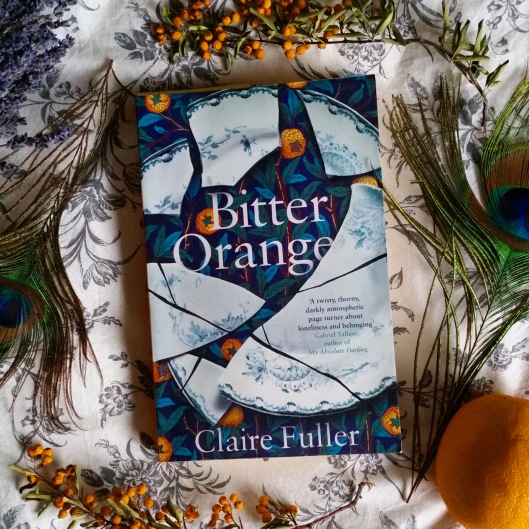Tags
4 stars, Bitter Orange, books, Claire Fuller, first time read, own book, read in 2018, reading, review

Title: Bitter Orange
Author: Claire Fuller
First published: 2018
Dates read: 29.10.- 6.11.2018
Category: first time read, own book
Rating: 4/5
The book in five words or less: immersive, compelling, lush
My thoughts:
Two women, one man, a decrepit old stately home, murky pasts, and a hot summer in 1969 are the ingredients of Claire Fuller’s Bitter Orange, a gripping page-turner that had me hooked from the beginning.
The book tells the story of Frances, engaged to catalogue the garden follies of a decrepit English country house, and of Peter and Cara, a couple who spend the summer at the estate with her. Slowly, a friendship emerges between awkward, friendless Frances and the young couple who turn out to be much more interested in sumptuous dinners and lounging in the sun than they are in cataloguing the contents of the house, the work Peter originally had been tasked with. But friendship is not all that blossoms. Over the course of the novel, Frances becomes increasingly obsessed with Cara and Peter, and it becomes more and more obvious that all is not well in their marriage. Stories do not add up, odd behaviours remain unexplained, and jealousy grows as slowly and persistently as the weeds in the overgrown estate gardens. Stumbling along in their web of lies, small betrayals lead to larger betrayals, until a tragedy brings the summer to an abrupt and horrible end.
Overall, I found Bitter Orange an incredibly fascinating, compelling read. Claire Fuller manages to capture the reader’s attention on several levels: Her writing is lush, immersive and detailed, so much so that laziness of the season, the colourful, decrepit estate, the simple but lavish dinners, and the summer heat become almost palpable. Fuller’s plotting is excellent, pulling the reader along a story that gyrates around its horrible end in circles that grow ever closer. She also manages to blend her two narrative levels – the events during that summer in 1969 and present-day Frances, telling her story as an old woman, close to death – extremely well. As for the actual events, they are both believable and fascinating as well as terrible to watch unfold. I will admit that I did suspect something like that ending might be coming about halfway through the novel, but that did not detract from my enjoyment watching it all play out.
And if you’re wondering why this was not a five star read for me, that is mainly due to the fact that I’m not sure how well the book would hold up to a reread (a lot of the narrative pull depends on the reader’s need to find out what really happened). I also would have liked some of the side plots, like Frances’ friendship with the local vicar Victor, to be a little more developed. However, those are really minor gripes that did not make my overall reading experience less satisfying.
Read if you like: Sarah Waters’ The Little Stranger, the decadence of Donna Tartt’s Secret History, country estates, the aesthetics of season 4 of ITV’s Endeavour, mysteries

Pingback: [Recommendations] Summer Books | Letters From The Lighthouse
Pingback: November Wrapup | Letters From The Lighthouse